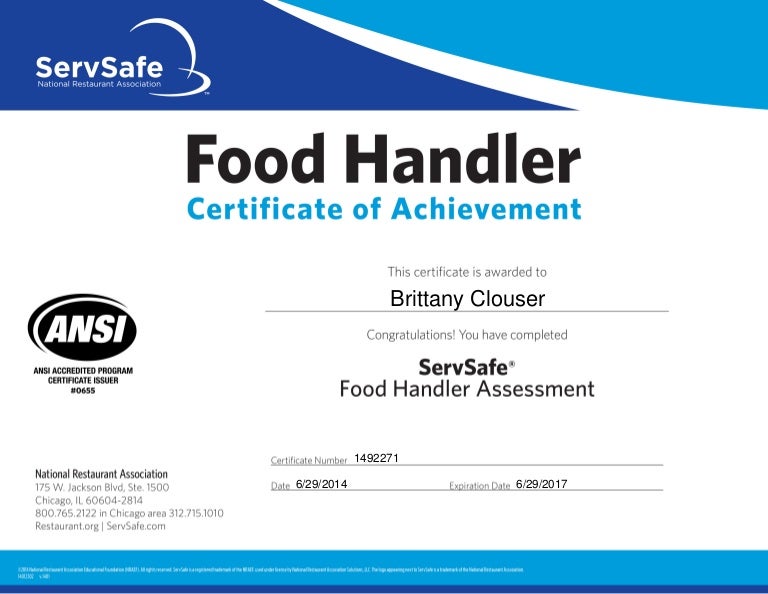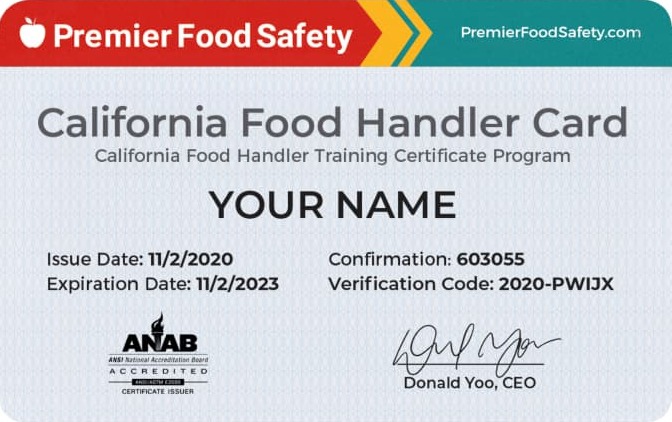How the ServSafe Food Handler Certification Prepares You for a Job in Friendliness
How the ServSafe Food Handler Certification Prepares You for a Job in Friendliness
Blog Article
Get Licensed: Master Food Security With Food Handler Accreditation
The relevance of obtaining a Food Trainer Accreditation can not be overstated in today's food service landscape. As the market deals with boosting examination pertaining to food safety standards, understanding the certification process and its ramifications ends up being important.

Relevance of Food Safety And Security Qualification
Food security accreditation is important for guaranteeing that food handlers are outfitted with the expertise and skills necessary to keep high standards of health and security in food prep work and service. This certification not just improves the proficiency of individuals functioning in the food market but additionally promotes a society of security that benefits both staff members and consumers.
By acquiring food safety and security accreditation, food handlers end up being accustomed to essential methods such as proper food storage, cross-contamination avoidance, and individual hygiene requirements. ServSafe Food Handlers Card. This understanding significantly minimizes the risk of foodborne ailments, which can have serious wellness ramifications and influence public rely on food facilities. Qualified food trainers are better prepared to conform with neighborhood and nationwide guidelines, thereby reducing the danger of lawful liabilities and charges for food organizations.
In addition, having licensed personnel can boost a facility's reputation, as consumers progressively prioritize safety and security in their eating experiences. Inevitably, food security accreditation is not simply a regulatory requirement; it is an important investment in the total top quality and integrity of food service operations, fostering trust and guaranteeing that safety and security continues to be a top priority in the industry.

Introduction of Qualification Process
Safeguarding food safety certification involves a structured procedure developed to outfit food handlers with the essential knowledge and abilities. This procedure normally starts with selecting an approved training program, which can be delivered in different layouts such as in-person classes, on the internet training courses, or hybrid options. Individuals should pick a program that meets neighborhood regulative needs and aligns with their understanding choices.
Once enlisted, prospects engage in detailed training that covers important food safety and security ideas and methods - ServSafe Food Handler. This training frequently includes interactive components, real-world situations, and assessments to reinforce discovering. After finishing the coursework, participants need to pass an accreditation test that examines their understanding of food safety concepts
Upon efficiently clearing the examination, individuals obtain their food handler certification, which is generally valid for a particular period, often ranging from one to three years. It is crucial for certified food trainers to remain upgraded with any type of adjustments in food safety and security laws and practices, necessitating periodic renewal or continuing education. This certification process is vital for guaranteeing that food handlers are well-informed about safe food handling practices, thereby lowering the danger of foodborne diseases and promoting public health and wellness.
Key Topics Covered in Training
An extensive food handler training program normally covers a number of vital topics necessary for maintaining food safety and avoiding foodborne diseases. Recognizing the principles of food safety and security is foundational, including the significance of proper hygiene techniques for food trainers. This includes handwashing techniques, proper use of handwear covers, and personal sanitation requirements.
An additional essential area is the recognition and administration of food hazards. Trainees learn more about biological, chemical, and physical dangers, along with methods for avoiding cross-contamination. Temperature level control is also stressed, as maintaining correct cooking and storage temperatures is vital for preventing microbial growth.
The training program addresses risk-free food storage space practices, describing how to appropriately classify and organize food products to make certain freshness and security. Additionally, participants are enlightened on cleaning and sterilizing procedures for tools and surfaces to get rid of potential impurities.

Benefits of Getting Certified
Obtaining food trainer certification provides numerous benefits that extend past individual expertise and abilities. It boosts an individual's understanding of secure food practices, which is critical in avoiding foodborne ailments. This knowledge not just safeguards the health of consumers yet likewise advertises a culture of food security within the office.
Additionally, qualification shows a commitment to professionalism and reliability and duty. Employers usually choose or call for certified workers, identifying that certified people are more probable to abide by safety and security procedures and regulations. This can bring about improved ergonomics and decreased responsibility for services, as skilled staff are much better furnished to deal with food securely.
Furthermore, acquiring certification can improve a person's confidence in their function within the food service market. This self-confidence can translate into far better client service and contentment, as staff members who recognize food security are more most likely to interact efficiently about cooking and handling.
Lastly, many certification programs offer upgraded training and sources, making sure that licensed individuals remain educated concerning the most up to date guidelines and finest practices, thereby enhancing their duty as experienced experts in the food safety landscape.
Career Opportunities in Food Safety
The foundation of food safety and security understanding gained through qualification opens a range of career chances within the food industry. As food security regulations end up being increasingly rigid, businesses look for certified experts to make certain compliance and preserve high criteria.
Individuals with food trainer certification can go after duties such as food safety examiners, that evaluate centers for adherence to wellness guidelines, or food safety and security managers, entrusted with establishing and implementing safety and security protocols in food handling plants or restaurants. In addition, functions in quality assurance and control are readily available, where Clicking Here professionals check production processes to minimize threats related to foodborne health problems.
Moreover, the growing pattern of food sustainability and natural items has developed opportunities for food safety professionals that specialize in recommending firms on best methods. Those with an accreditation can additionally check out placements in education and learning and training, helping to inform others concerning safe food managing techniques.

Conclusion
Food trainer qualification offers as an essential component in improving food security within the food solution industry. By obtaining this certification, individuals not just get important expertise and skills yet likewise add to the overall this page health and safety and security of consumers - ServSafe Food Handler. The rigorous training guarantees adherence to hygiene techniques and hazard monitoring, eventually cultivating a much safer eating atmosphere. As food safety and security continues to be a top priority, the certification opens up doors to numerous career chances in this important area.
By acquiring food security accreditation, food trainers come to be acquainted with crucial practices such as proper food storage, cross-contamination prevention, and personal hygiene standards.Protecting food safety and security certification includes an organized process made to gear up food trainers with the necessary knowledge and abilities. It is vital for certified food trainers to click remain upgraded with any type of changes in food safety and security guidelines and practices, demanding routine revival or continuing education.A comprehensive food handler training program normally covers a number of crucial subjects important for maintaining food security and stopping foodborne diseases.Food trainer qualification serves as a vital element in enhancing food safety and security within the food solution sector.
Report this page